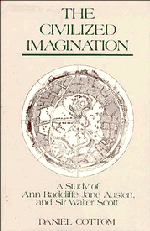8 - Superstition and the enchanted reader
Published online by Cambridge University Press: 06 August 2010
Summary
I am, I own, no great believer in the moral utility to be derived from fictitious compositions; yet, if in any case a word spoken in season may be of advantage to a young person, it must surely be when it calls upon him to attend to the voice of principle and selfdenial, instead of that of precipitate passion.
– SIR WALTER SCOTT, The Fortunes of NigelSuperstition is a major element in almost all of the Waverley novels and would merit attention if only for that reason. Its significance, however, goes beyond the fact that it is a characteristic topic in Scott's fiction as well as in other works loosely grouped under the title of Romanticism, such as “the Rime of the Ancient Mariner.” For the attitude Scott takes toward superstition is a contradictory one, at once rational and superstitiously irrational in its own right; and this contradiction is repeated in the attitudes he takes toward the past, women, class differences, and the reader. By analyzing the appearance of superstition in Scott's work, in fact, one may come to a new reading of that work that not only helps to restate its importance in literary history but that also helps to show how the contradictions within it are essential to its masterly style.
Superstition would be an entirely uncomplicated topic in Scott's novels if the rational notice taken of it were allowed to pass unchallenged.
- Type
- Chapter
- Information
- The Civilized ImaginationA Study of Ann Radcliffe, Jane Austen and Sir Walter Scott, pp. 148 - 170Publisher: Cambridge University PressPrint publication year: 1985

